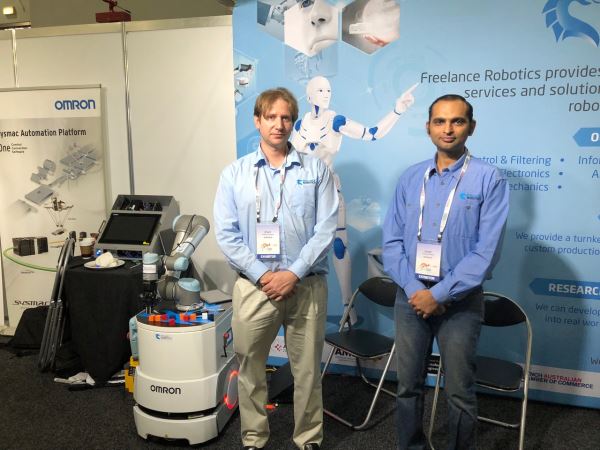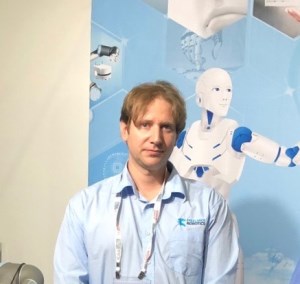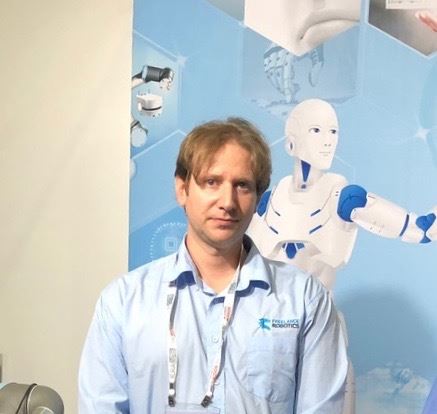Rather than fearing robotics and automation, Australian industry should embrace it, a robotics expert insists.
William Pagnon, the CEO and founder of Freelance Robotics, says Australian companies – particularly in the manufacturing sector – have been slow to embrace Industry 4.0 compared with other advanced nations.
“Perhaps it is a fear of failure or a reluctance to change. But they are doomed if they don’t embrace it,” he warns.
“They simply cannot survive … it’s a case of automate or die.
“Companies that don’t change with the times will become less competitive and their margins will be much thinner. It’s impossible to compete globally.”
Mr Pagnon says with any transition there is always a bit of pain – and always a few hiccups – that is normal.
“But automation delivers better outcomes for both consumers and producers.”
Benefits include:
- Increased production
- Decreased labour costs
- Increased profit margins
- Improved workplace safety
- Improved quality
- Less floorspace needed for production
Based in Brisbane, Freelance Robotics assists companies to make the transition to Industry 4.0 and Internet of Things (IoT).
Their services include robotics & automation, artificial intelligence (AI), Information Technology (IT), software development, electronics, mechanics, custom built drones, custom sensor systems, navigation systems and Data Mining systems.
For its clients the company has developed a host of solutions including factory labelling systems, “smart” windows, a smart smoke alarm and even a lawn bowls scoring system.
Freelance Robotics also assists companies with R&D projects and works closely with Startups to develop prototypes to take to market.
Solutions on display at ICRA 2018
In collaboration with global automation giant Omron, Freelance Robotics had some of its high tech solutions on display at the recent International Conference on Robotics and Automation (ICRA 2018) in Brisbane.
This included Omron’s smart LD series mobile robot and a Quattro Parallel robot for high-speed applications in packaging, manufacturing, assembly, and material handling.
Freelance Robotics supplies a full range of Omron products including its renowned Sysmac automation platform.
“We have been working with Omron on different projects for many years,” Mr Pagnon says.
“Omron provides a total solution. Their products are easy to use and very reliable.
“They can be used for simple projects or for something out of the box – it gives you both options.”
Mr Pagnon says ICRA was a great opportunity for Australia to showcase its robotics technology to the world.
“It was a great coup for Brisbane and I was proud to be a part of it.”
Fascination for machines
Brisbane is fast earning a reputation as Australia’s robotics hub, with the Australian Centre for Robitics Vision, Queensland University of Technology (QUT), University of Queensland (UQ) and the CSIRO all based there.
And Freelance Robotics is one of several robotics companies now calling Brisbane home.
Mr Pagnon, who has two Masters degrees – one in robotics and automation from E.S.I.E.A. (France) and one in Mechatronics from the University of Queensland (UQ) – was always destined for a career in robotics.
As a young boy growing up in Brittany, he had a fascination for machines.
At that time, most children in France were happy to turn on the TV and watch.
“But I wanted to know how the TV works,” he explains.
“When I turned 14 I decided I wanted a career in engineering and robotics – I could see then this would be the future.”
Mr Pagnon moved to Brisbane from France 13 years ago to study mechatronics at UQ.
Gap in the market
After working for a robotics company for a couple of years, he identified a major gap in the market.
No-one was providing total robotics and automation solutions for business – R&D, automation, software and marketing.
So, in 2009 Freelance Robotics was born.
“Our business specialises in research and development projects, with an emphasis on robotics applications.”
Mr Pagnon is a recognised expert on the 4th industrial revolution – (Industry 4.0 and IoT) – and the merging of new technologies.
Smart factories, where the entire process from product order to delivery is automated, are a key feature of the 4th industrial revolution.
Mr Pagnon says much of the technology needed to make the digital transformation is readily available from companies like Omron and ABB.
“They are off-the-shelf ‘plug and play’ systems that can be easily installed.”
More highly skilled roles
While he admits automation will result in fewer jobs on the factory floor, it will increase the number of office jobs, with more highly skilled roles created.
Those working in dirty, repetitive or dangerous tasks would be re-trained and re-skilled for more challenging roles.
“Germany has been investing in digital technology for the past 20 years,” says Mr Pagnon.
“Nearly all German companies have brought their manufacturing back from China.
“And employment has been increasing as the number of robots has increased in factories.”
Mr Pagnon says automation can reduce work hours and provide more productive and interesting work.
“There will be a big improvement in lifestyle … people will have more time to do other things.”
The next big thing
Mr Pagnon predicts social robots will soon become the next big thing.
“In 10 years’ time you will see social robots everywhere,” he says.
They are now being widely used in hospitals and to assist the elderly in aged care facilities.
Social robots can be programmed to remind elderly patients to take medication or can be used to interact with dementia patients. And they can send alerts if patients wander outside a designated area.
Also, we can expect to see a growing number of social robots used for education and as companions.
Cloud connected
Freelance Robotics is a distributor for Sanbot social robots.
Sanbots are small humanoid robots that are fitted with cameras, sensors and a projector making them ideal to interact with people to provide information and other services. They are cloud connected so they can interact with other services and information in the cloud.
Sanbot has already been successfully deployed in police, education, healthcare, immigration and concierge services.
Mr Pagnon says social robots now range in price from $5000 to $10,000.
But like most technology, prices are falling and in coming years social robots will be affordable for the average household.
For companies now seeking automation solutions, Mr Pagnon offers the following advice:
“Look carefully first, but don’t wait too long … and always seek professional advice.”


